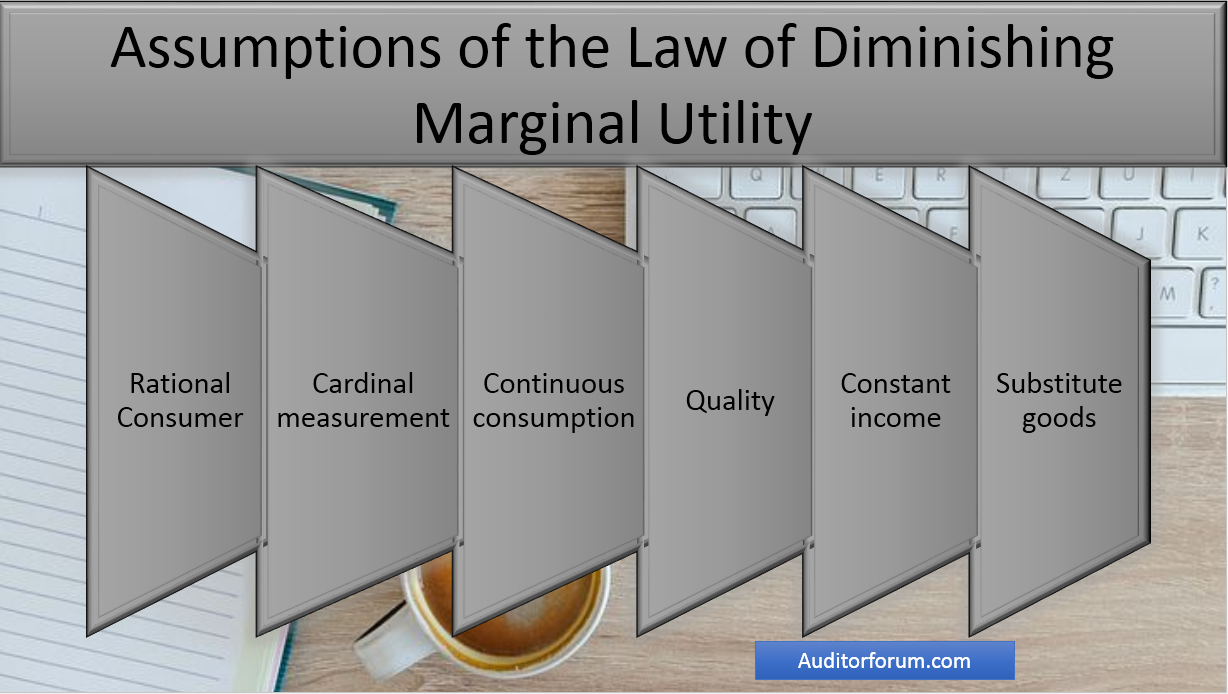Law of Diminishing Marginal Utility
Definition:Eminent economist Alfred Marshall defines the Law of Diminishing Marginal Utility as follows:
“The additional benefit which a person derives from a given increase of his stock of a commodity diminishes with every increase in stock that he already has”.
According to the Law of Diminishing Marginal Utility, the additional satisfaction derived from consuming additional units of a commodity will diminish with each successive unit consumed. The total utility will continue to increase as each successive unit is consumed, up to the point when the marginal utility is positive. The Law of Diminishing Utility is subject to all other conditions remaining the same e.g. incomes, fashion and tastes.
[wpipa id="616"]
Assumptions of the law of diminishing marginal utility:
Consumer is rational: It is assumed that the consumer is rational who aims at maximizing his utility and market knowledge is readily available to all.
Cardinal measurement: the law assumes that the utility is measurable and could be expressed quantitatively e.g. 1, 2, 3 etc.
Continuous Consumption: It is assumed that the consumption is a continuous process and there must not come any gaps in between. For instance if a person consumes one ice cream in the morning and another in the afternoon then the second ice cream might give him more utility.
Quality: Quality of the product being consumed must remain the same. For instance a second cup of ice cream with nuts and toppings might give more satisfaction than the first one that was without the nuts and the toppings. To sum up, it says, all the units should be the same in all respects.
Constant income: The consumer’s income should not change while consuming the goods. The law applies as long as the consumer’s income remains the same.
Consistency in consumer’s taste and fashion trends: To hold the law good, the consumer’s taste and the fashion trends should also remain the same throughout the process.
Substitute goods: Changes in the prices of substitute goods have impacts on the consumption of commodities in use. For instance if CNG and Petroleum are substitute goods then change in price of petroleum would affect the demand of CNG without there being any change in the CNG prices. Therefore, there should not be any changes in the price of the substitute goods while analyzing the law for one commodity.
[wpipa id="616"]
Limitations of the law of Diminishing Marginal Utility:
Following are the limitations of the law of Diminishing Marginal Utility:
[wpipa id="616"]
Reasonable time: The units of commodity should be consumed at a stretch, otherwise law will not hold good. If the commodity consumed is meal, it should be taken continuously to prove the validity of law.
Reasonable unit: The unit of the commodity to be consumed should be suitable. For example, the reasonable unit for milk is a glass of milk rather than a spoon of milk.
Taste and fashion: To prove the validity of the law, the taste & fashion should not change, because the change in taste or fashion changes the psychology of the consumer and his additional utility for an additional unit of commodity will increase instead of diminishing.
[wpipa id="616"]
Consumer’s income: If the consumer’s income changes, the law will not apply. Often, the increase in consumer’s income increases the marginal utility of a good.
Share this topic with your Class fellows and keep visiting for more updates on this topic please provide feedback on auditorforum. We are keen to know your views in comments about the situation defined in the question.






